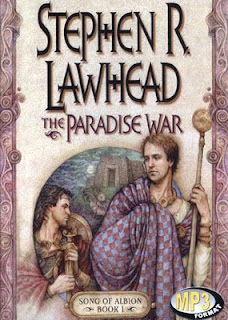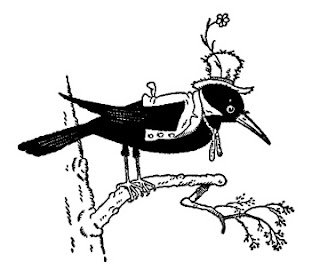Frost and Snow Fall, Mingled with Hail
Ubi sunt? Where are they now? Winter becomes a personification of Death; falling snow as an emblem of loneliness. A snow covered, wind-battered wall as a picture of man’s infinite sorrow. And yet, in the distance, the light of hope in heaven is pinpointed on the horizon, and the wise man sits “apart in private meditation” (Greenblatt 113). These are some of the stronger themes and motifs in The Wanderer, a poem of lament from pre-tenth century England, enriched, as is characteristic of poetry of the time, with beautiful and creative kennings, a formula of descriptive words used to stand in for a noun. The elegiac poems of Old English literature shared much in common while still displaying a certain individuality, laying the groundwork and using many of the same themes and ideas as later writers such as “Donne, Arnold, Tennyson, and Milton” (Greenfield 2). In turn, Greenfield conjectures that the De Consolatione Philosophiae, written by an imprisoned Christian awaiting his execution might have influenced the authors of Beowulf and The Wanderer (34). The Wanderer and another elegiac poem The Seafarer “were, in earlier criticism, disintegrated into pagan and Christian strata” but now are both “viewed as unified structures and the product of the cloisters” (Greenfield 217).
The theme of Ubi sunt pervades such poems as The Wanderer; mournful cries of “‘where has the horse gone? Where the young warrior?’” echoing throughout (Greenblatt 113). Traces of the lament can even be found in Beowulf, which has sometimes been described as an epic, although in his essay The Monsters and the Critics Tolkien declares that “no terms borrowed from Greek or other literatures exactly fit” and rather describes it as “an heroic-elegiac poem; and in a sense all its first 3, 136 lines are the prelude to a dirge … one of the most moving ever written” (31). With such a powerful emotional pull being even stronger in The Wanderer, it is hard to believe any other ideas could have room to breath, and yet the entire poem is full of vivid imagery that stand in good harmony with each other and with Ubi sunt. The first part of the poem shows the unnamed protagonist as a broken, weary soul who longs for close companionship and family to unburden his sorrows on, mourning, “often before day dawned I have had to speak of my cares, alone: there is now none among the living to whom I dare clearly express the thought of my heart” (Greenblatt 112). The haunting sea that the protagonist seems doomed to roam forever, empty and restless, is a symbol of the wanderer’s exile.
After this, the poem changes directions in two ways; namely that the character of the wanderer seems to have undergone a change to be more thoughtful in a philosophic way and less self absorbed, and the language of the poem itself varies slightly in that it only once more references the sea; all other notations as to allegorical surroundings site things to do with dry land such as horses, walls, and “snow, the herald of winter” coming to bind the earth (Greenblatt 113). And all this leads up to the poem’s end; an exhortation to look to God and the next world to provide the stability that this world lacks.
Greenfield claims that the syntax of the verse’s opening lines suggest that Christian values are already being hinted at through delaying the “conventional association of ‘wretchedness’ and ‘lone-dwelling’” and replacing it at first with “often the lone-dweller experiences mercy” (76). But just as easily, the reading could be interpreted as avoiding reference to Christianity, and slowly revealing the wisdom the wanderer finds through his long years of suffering and his final philosophical conclusion, almost as if the listeners – or, today, readers – were experiencing both the pain and the somber joy for themselves.
While Beowulf is a mixture of the heroic and elegiac, Greenfield again points out that The Wanderer is “in the tradition of the Classical and Christian literary genre of the consolatio” (218). However, it is interesting to note the distinction made by another author, Hill, who compares Beowulf to two other poems of a slightly later period; The Battle of Brunanburh and The Battle of Maldon. He states that while these latter two were “composed carefully by makers who understand complexly the situations and persons involved” they are “simply much more polemical when compared to Beowulf and its inset stories. They are shaped more as arguments than as presented worlds, arguments regarding entirely justified violence” (Hill par 9). According to Hill, these other stories have a political undercurrent where “traditional loyalties are appropriated to model new ideas of loyalty to a state” (par 5).
Regardless of how one interprets The Wanderer, its inherent beauty of imagery remains unchanged, and the human sorrow of the nameless exile calls out to the reader; the poignant image of emptiness and loss captured in the wanderer’s dream of home when “he wakes again, the man with no lord, sees the yellow waves before him, the sea birds bathe, spread their feathers, frost and snow fall, mingled with hail” (Greenblatt 112).
Works Cited
Greenblatt, Stephen, ed. The Norton Anthology of English Literature. 8th ed. New York: W. W. Norton & Company, 2006. Print.
Greenfield, Stanley. A Critical History of Old English Literature. New York: New York University Press, 1965. Print.
Tolkien, J. R. R. The Monsters and the Critics and Other Essays. Boston: Houghton Mifflin Company, 1984. Print.
Hill, John. "Shaping Anglo-Saxon Lordship in the Heroic Literature." Heroic Age 3 (2000): n. pag. Web. 30 Nov 2009.








